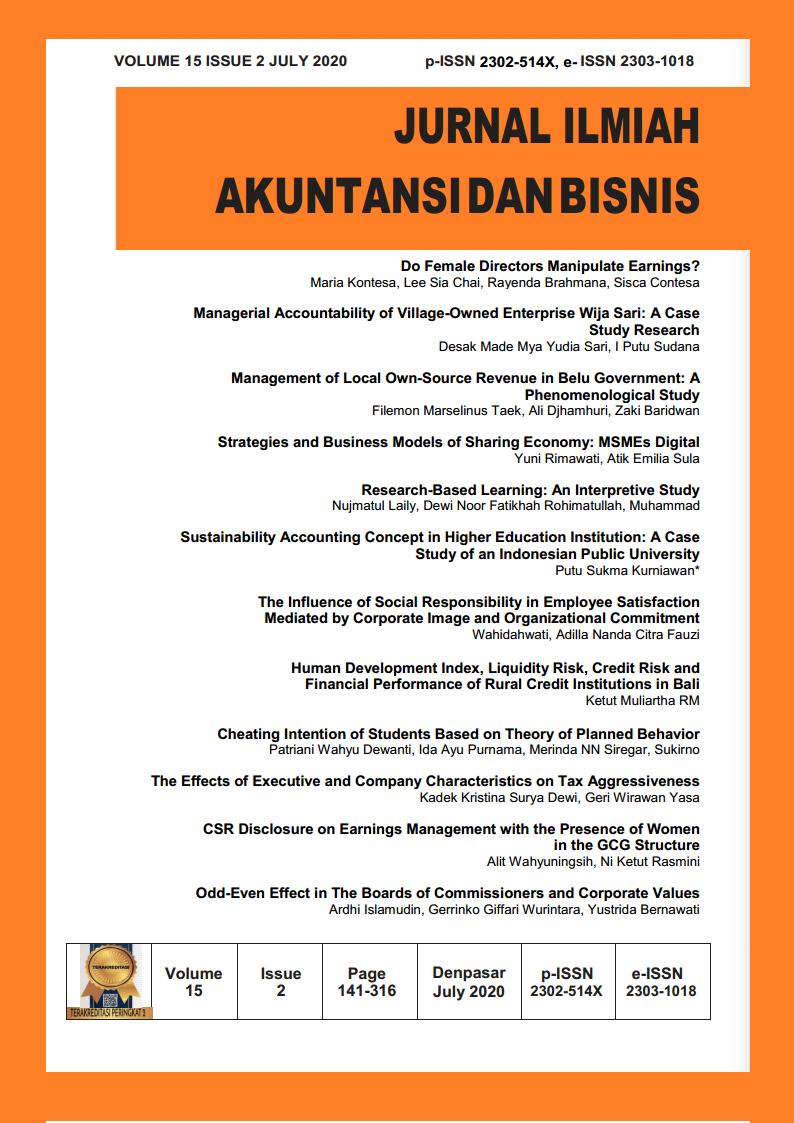Sustainability Accounting Concept in Higher Education Institution: A Case Study of an Indonesian Public University
Abstract
The change in the accounting paradigm has now shifted from conventional accounting to sustainability accounting. This study seeks to develop a model for implementing sustainability accounting in educational sector organizations. The object of this research is the Universitas Pendidikan Ganesha, Bali. This research used a qualitative approach. This research is divided into two main stages. The first stage is the stage of observation regarding the current accounting system. At this stage, data will be searched for the development of the sustainability accounting implementation model. The method of collecting data in the first stage is to conduct interviews, observation, and document analysis. The second stage is the stage for designing the sustainability accounting implementation model. The output of this research is a concept or model regarding the application or implementation of sustainability accounting in the activities of educational sector organizations. The results of this study are expected to provide guidelines for educational sector organizations (universities) in the context of applying sustainability accounting concept.
Downloads
References
Adams, C. A. (2013). Sustainability reporting and performance management in universities: Challenges and benefits. Sustainability Accounting, Management and Policy Journal. https://doi.org/10.1108/SAMPJ-12-2012-0044
An, Y., Davey, H., Harun, H., An, Y., Davey, H., & Harun, H. (2017). Sustainability Reporting at a New Zealand Public University: A Longitudinal Analysis. Sustainability, 9(9), 1529. https://doi.org/10.3390/su9091529
Cohn, E., & Geske, T. G. (1990). The economics of education. United States of America: Pergamon Press.
Domingues, A. R., Lozano, R., Ceulemans, K., & Ramos, T. B. (2017). Sustainability reporting in public sector organisations: Exploring the relation between the reporting process and organisational change management for sustainability. Journal of Environmental Management, 192, 292–301. https://doi.org/10.1016/j.jenvman.2017.01.074
Farneti, F., & Guthrie, J. (2009). Sustainability reporting by Australian public sector organisations: Why they report. Accounting Forum. https://doi.org/10.1016/j.accfor.2009.04.002
Kaur, A., & Lodhia, S. (2018). Stakeholder engagement in sustainability accounting and reporting. Accounting, Auditing & Accountability Journal, 31(1), 338–368. https://doi.org/10.1108/AAAJ-12-2014-1901
Lange, E. A., & Kerr, S. G. (2013). Accounting and incentives for sustainability in higher education: An interdisciplinary analysis of a needed revolution. Social Responsibility Journal. https://doi.org/10.1108/SRJ-08-2011-0058
Lozano, R. (2006). A tool for a Graphical Assessment of Sustainability in Universities (GASU). Journal of Cleaner Production, 14(9–11), 963–972. https://doi.org/10.1016/J.JCLEPRO.2005.11.041
Lozano, R. (2011). The state of sustainability reporting in universities. International Journal of Sustainability in Higher Education, 12(1), 67–78. https://doi.org/10.1108/14676371111098311
Nickie Petcharat, N., & Mula, J. M. (2012). Towards a conceptual design for environmental and social cost identification and measurement system. Journal of Financial Reporting and Accounting, 10(1), 34–54. https://doi.org/10.1108/19852511211237435
Richardson, A. J., & Kachler, M. D. (2016). University sustainability reporting: a review of the literature and development of a model. In Handbook on sustainability in management education. University of Windsor.




















